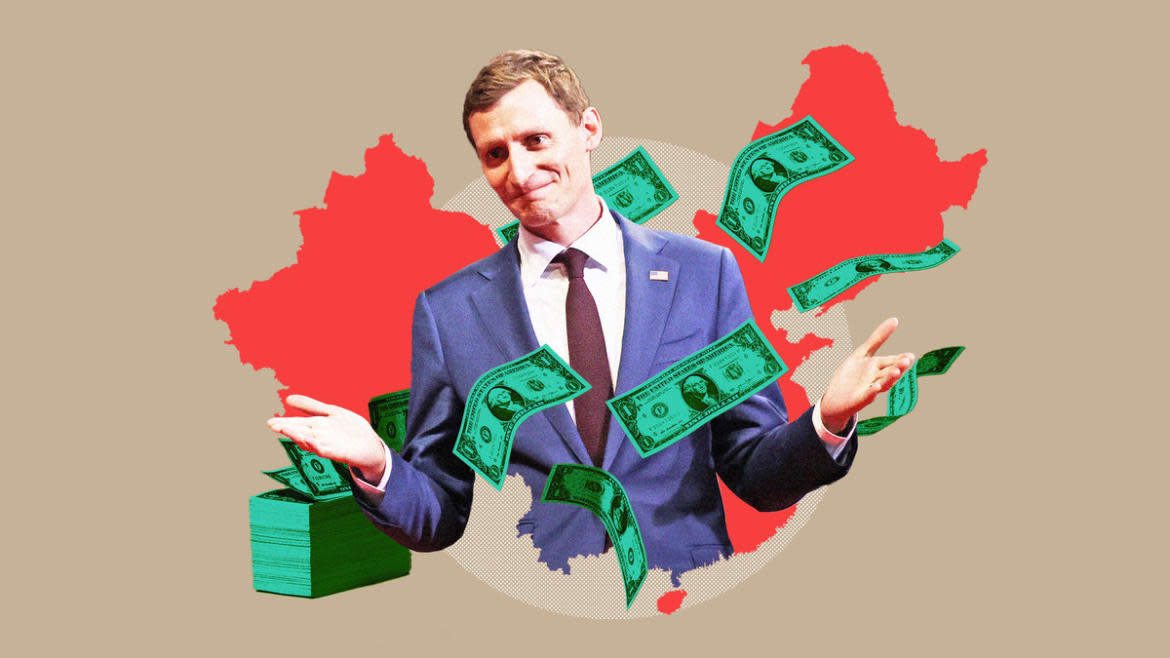Blake Masters Says He’s Avoided Chinese Investments. Untrue.

- Oops!Something went wrong.Please try again later.
- Oops!Something went wrong.Please try again later.
California tech financier turned Arizona GOP senate candidate Blake Masters often cites his own business record as a model for his hardline anti-China policies, claiming that as an investor he had not raised money for “a single startup” in China, and wanting to “literally ban” Chinese nationals from working for U.S. companies out of national security concerns.
One problem.
It turns out, Masters has participated in multiple funding rounds for a Chinese biomedical startup—including alongside Chinese Communist Party investors. He also had business ties to a second, U.S.-based medical company when it was honored by a CCP-backed organization.
Both relationships came through Thiel Capital, where Masters worked under his mentor and “best friend” Peter Thiel since 2014. This May, Masters boasted about the firm’s anti-China record in an interview with Tucson conservative radio host Garrett Lewis.
“Peter Thiel and I have basically avoided doing business with China at all costs,” Masters said, adding that “to my knowledge, there’s not a single startup that Peter invested in or that I invested in at Thiel Capital that’s Chinese. We have the least exposure of basically any venture capitalist to China.”
While the comparative level of exposure is certainly open for debate, the claim that they haven’t invested in a Chinese startup is false.
During Masters’ time at Thiel Capital, the firm made a string of three investments in a Chinese pharmaceutical company called Beijing Imunopharm Technology Co., Ltd, aka “Immunochina.”
How a Trumpy Billionaire Is Single-Handedly Reshaping Campaigns
According to Immunochina, between 2016 and 2019, Thiel Capital contributed to the startup’s Series A, Series B, and Series C funding rounds. While the size of the individual investments is not public, Immunochina—which develops gene and cell therapies to treat cancer—claims to have raised a total $28.1 million, according to Crunchbase data.
Further, the Thiel investment appears to have funded only Chinese projects. An article announcing the Series C round in 2019 said that Immunochina was at the time of the investment still “targeting China’s domestic market,” and had not yet branched out to other countries.
For Masters, whose xenophobic anti-immigration rhetoric has laid blanket attacks on Chinese nationals, that’s a sticking point. But he would seem to have to reconcile that position with the fact that his co-investors are members of the Chinese Communist Party.
A spokesman for Masters did not respond to a request for comment.
Like many Republicans, Masters sees Beijing as “the number one geopolitical threat,” and has declared multiple times that the United States is in “a Cold War with China.” But Masters steps outside the mainstream with claims like “we should literally ban Chinese nationals from studying in our universities, from working in our companies,” which he stated at an event in Chandler, Arizona, this April.
At that event, Masters called Chinese Americans “as American as me” (clarifying “that’s great”), but added that “if you are a Chinese national, we have to presume you have a relationship with the Chinese Communist Party.”
“That’s how totalitarianism works, right?” he said.
Last September, Masters claimed in a podcast interview that the United States was “giving [China] the keys” by “inviting tons of Chinese nationals to come here and study in our universities, work in our companies.”
“Of course, all that material just gets fed back into the CCP like this is an actual communist regime,” Masters said, adding that “I’m going to put a stop to it.”
But the lead investor in Immunochina’s fundraising rounds—Chinese-based Legend Capital—was run by members of the CCP.
California Venture Capitalist Blake Masters Wins AZ GOP Senate Primary
According to the Legend Holdings website, its founder and former chairman was twice named a delegate to the CCP’s National Congress—the country’s highest governing body. And Legend Capital’s managing director is also a party member, according to Bloomberg.
Masters is far from the first candidate revealed to have a hidden relationship with China. Former President Donald Trump, who took anti-China rhetoric and policy to a new level, was repeatedly exposed as a hypocrite, rife with conflicts of interest—which he at times embraced as proof he knew how to deal with Beijing.
And as the Chinese economy and government have muscled up, the issue has only become an increasingly popular line of attack. But while candidates in both parties are routinely targeted for Chinese ties, the country’s growing influence in the global economy makes it difficult for elected officials and business leaders to snub Beijing entirely—as well as to cleanly navigate an increasingly complex political reality, while maintaining ideological purity.
In fact, a GOP candidate with exceptionally close ties to Masters and Thiel—JD Vance in Ohio—recently got caught up in the dilemma. After the passage of a massive legislative package designed in part to combat Chinese microchip manufacturing, Vance found himself in opposition to other Republicans in his state, while agreeing with his Democratic opponent.
In this fraught environment, however, Masters has chosen to stake out a distinctly combative, zero-tolerance position, which he frequently invokes on the campaign trail—as well as in multiple fundraising pitches for donor dinners with himself and Thiel, whose antipathy for Beijing is also well documented.
“Want to have dinner with me and Peter Thiel?” Masters tweeted in April, offering the prize to donors who give $5,800.
The dinners, he promised, “are great fun,” including “China” in a list of sample topics.
If supporters couldn’t afford that price tag, however, Masters had a consolation prize.
“If you can give $200 by end-of-month, you’ll get a cool NFT and a signed copy of Zero to One,” the book he co-authored with Thiel, which, as Masters has acknowledged, was sold in 41 countries—including China.
Get the Daily Beast's biggest scoops and scandals delivered right to your inbox. Sign up now.
Stay informed and gain unlimited access to the Daily Beast's unmatched reporting. Subscribe now.

